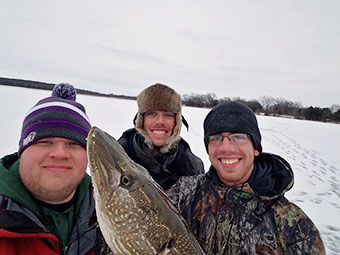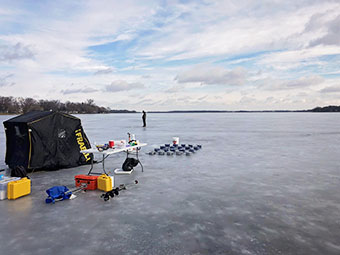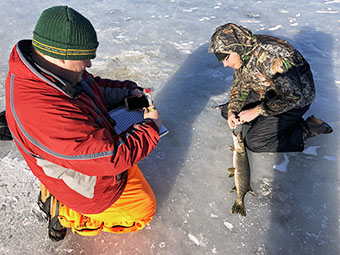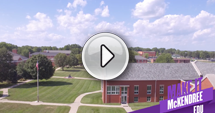Dr. Michael Louison and Andrew Althoff

By Alec De Yong ‘20
As winter break winded down, students and faculty members prepared for the semester;
moving back in, finishing lessons and schedules, and readying themselves mentally
for the next 16 weeks. Professor of Biology Dr. Michael Louison and junior Andrew Althoff opted to start their work early however.
“I went from Christmas right out onto the ice… and went basically right from out on
the ice to back here again,” Mike said. Mike and Andrew spent nine days, from January
3rd to 11th, in Wisconsin working with colleagues from the University of Winnipeg
and the University of Illinois Urbana-Champaign on a suite of research projects.
When Mike says he went out onto the ice, he means it quite literally. The team’s research
took place on the frozen surfaces of Grand Lake and Fox Lake, where they spent their
time ice angling or ice fishing.
Both Mike and Andrew are fishermen. Mike has completed previous studies on the subject
matter and Andrew is a member of McKendree’s bass fishing team. Being a biology major
as well as a passionate angler, Andrew was put in contact with Mike by his bass fishing
coach.

“We’re pro-fishing,” Mike said of the pair, “it’s all about how do we handle fish
best” and ensuring “that catch and release is actually working.”
There were three studies being conducted by the team. The first of these was led by
Mike and Andrew. Their study focused on Northern Pike and the potential damage that
is caused by anglers waiting for long periods before catching a fish that has been
hooked.
In ice angling, a device called a tip-up is placed over a hole in the ice with a line
running into the water. When a fish bites, a flag goes up on the device and the angler
has to go to the device to reel it in. Mike elaborated that while some anglers will
quickly jump out to catch the fish, others might take their time and finish their
drink before making their way to the tip-up. Andrew’s research looked at the detrimental
effects this could have on the health of captured fish. They looked at the correlation
between how long they waited before catching the fish and how far down the hook ended
up in the fish’s throat or stomach.
Mike and Andrew often practice catch and release fishing and shared that letting fish
sit like this can have negative effects on the fish population. Once the fish swallows
the hook, some anglers will cut the line, leaving the hook in the fish. Even worse,
some will yank the hook out which damages the gills and throat of the fish. Both outcomes
are harmful for the angled fish and this is what their research focused on.
During their study, they got 142 bites and varied the times between the fish biting
and them catching it from eight seconds to six or seven minutes. They would then see
where the hook was in the fish and if it had swallowed the hook. “Me and Caleb (a professor of biology at the University of Winnipeg) with our fancy
degrees were the ones shuttling things back and forth,” joked Mike. He enjoyed seeing
Andrew and John, a student from the University of Illinois, step up while he and his
colleague put in the grunt work. “It was good to see Andrew, and not only him but
John, take the lead.”
“Me and Caleb (a professor of biology at the University of Winnipeg) with our fancy
degrees were the ones shuttling things back and forth,” joked Mike. He enjoyed seeing
Andrew and John, a student from the University of Illinois, step up while he and his
colleague put in the grunt work. “It was good to see Andrew, and not only him but
John, take the lead.”
Andrew also enjoyed the opportunity to get hands-on experience in the field. “I’d
like to work with applied sciences, especially biology, environmental studies, and
fishing,” he said. He was able to take part in not only his own research, but the
other studies as well, helping to catch fish.
The other two studies, which were led by colleagues from the two partner universities,
looked at the tissue damage and gene expression of caught fish depending on how long
they were left on the ice after capture. The samples Mike and Andrew obtained were
taken by their fellow researchers to their respective universities.
The benefits of this research could be huge as well. When it is all said and done,
the valuable hands-on experience gained by Andrew, the actual data from the research,
and both McKendree and Mike having more scientific output are all positive outcomes.
“From a scientific point of view, you’re always trying to put out knowledge; you’re
always trying to publish papers,” said Mike. He also discussed “cranking up” the
research output on campus.
![]() "This isn’t just a place where you have great teachers, which we have here…but hey,
you can come here and do legit research too, you can be a part of studies that get
published in peer reviewed journals."
"This isn’t just a place where you have great teachers, which we have here…but hey,
you can come here and do legit research too, you can be a part of studies that get
published in peer reviewed journals."
Learn more about the Biology program and McKendree University.
Make It McKendree

